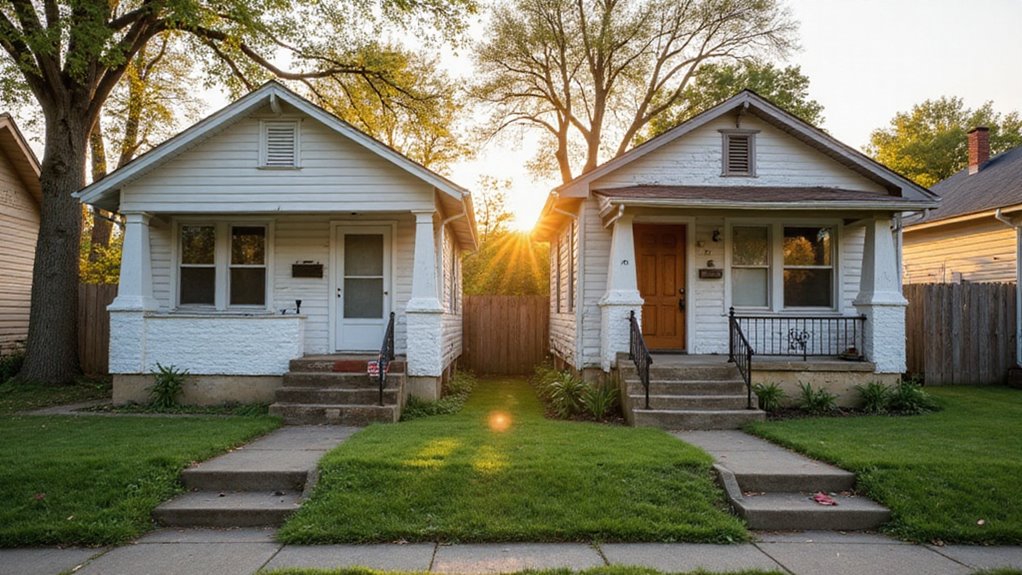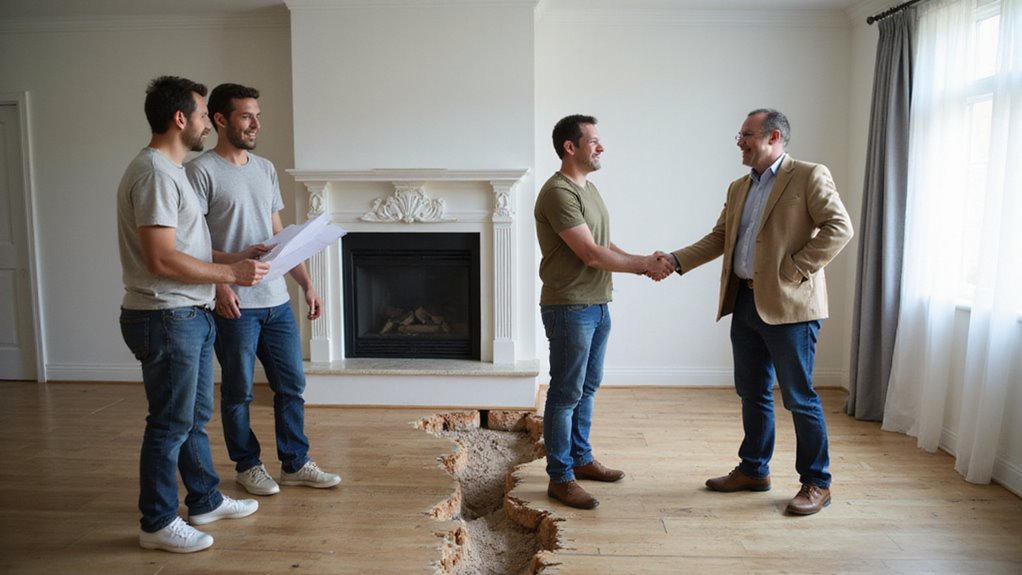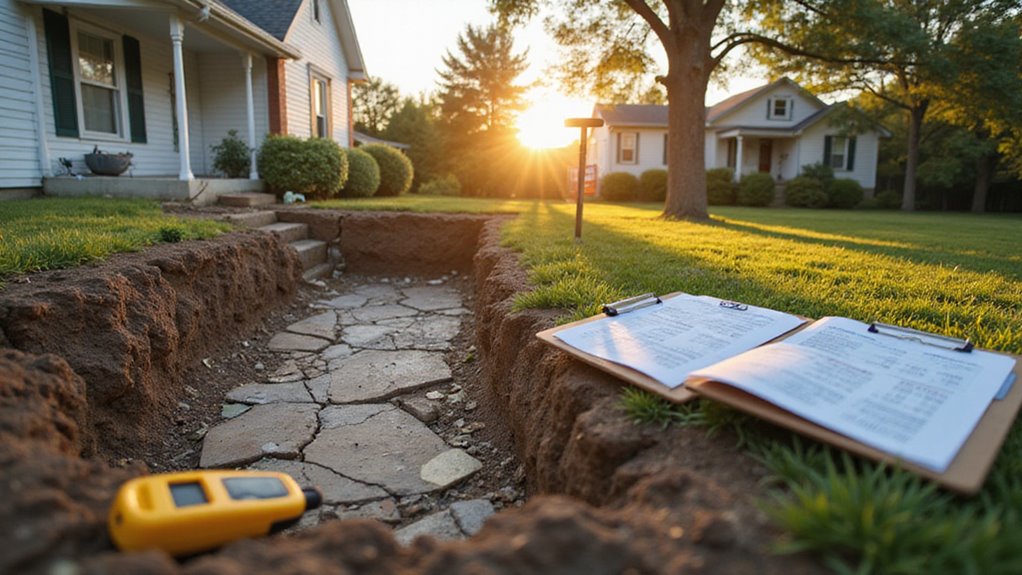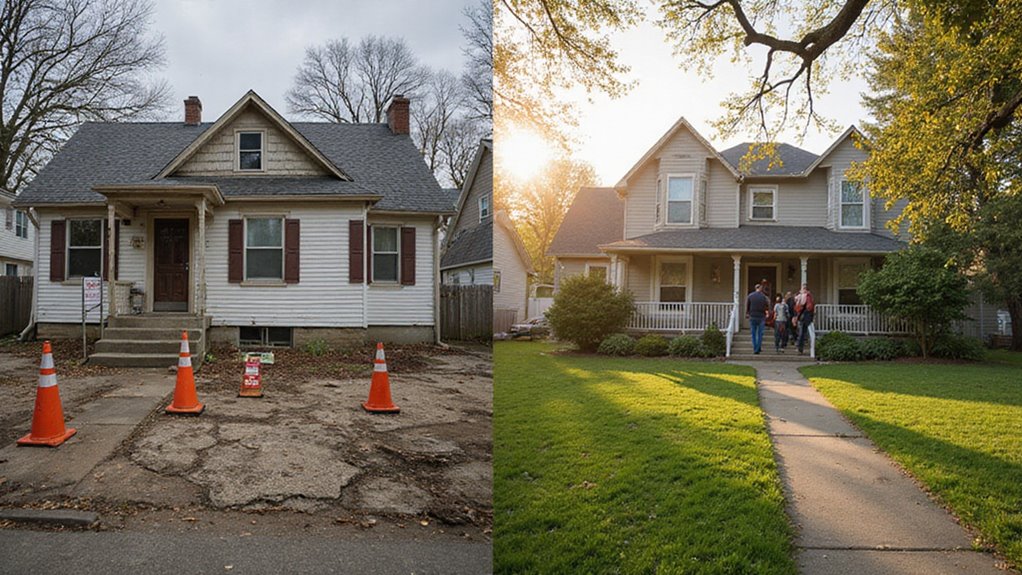Selling a house with foundation damage is not like a regular home sale. Foundation problems scare away many buyers and make financing difficult. You need to know how this issue changes the whole selling process.
These problems lower your home’s value and limit your buyer pool. Buyers worry about costly repairs and may walk away after inspections. You might wait longer or lose money if you don’t address these challenges.
The main difference is that selling a house with foundation damage often requires targeting investors or cash buyers instead of traditional buyers.
This approach speeds up the sale and avoids loan issues. You must adjust your strategy to get the best outcome. This blog will show you how to handle foundation damage and sell your house with less stress and better results.
Key Takeaways
- Homes with foundation damage attract fewer buyers and often sell for significantly less than move-in ready, traditionally sold homes.
- Sellers must legally disclose foundation issues, unlike traditional sales where structural defects may not be present or as severe.
- Foundation problems complicate financing, as many lenders refuse loans, while traditional sales typically qualify for standard mortgages.
- Selling with foundation damage often involves lengthy negotiations, repair estimates, and delays compared to the smoother process of traditional sales.
- Damaged homes are usually marketed to cash buyers or investors, unlike traditional sales that target typical homebuyers seeking minimal repairs.
Understanding Foundation Damage and Its Impact on Home Value

Foundation damage can lower your home’s value. It weakens the house and can scare away buyers or lenders. If your foundation is not stable, your home will likely sell for less. Foundation damage weakens your home and can scare off buyers, often leading to a lower selling price.
You might see uneven floors or cracks in the walls. Sticking doors are another sign of foundation problems. These issues show your house may not be safe. Buyers in Virginia often pay close attention to property condition when deciding how quickly to make an offer or how much to pay.
Repair costs for foundations can be high. If you need big repairs, your home’s worth can drop even more. Lenders may refuse loans if they find serious damage.
If you understand how foundation issues affect value, you can plan better. Assessing the damage helps set a fair price before selling. If you fix problems early, you may avoid bigger losses.
Even with repairs, disclosure of foundation issues is required by Virginia law, so buyers will be aware of the property’s condition during the sale.
Typical Buyer Expectations in Traditional Home Sales
In a traditional sale, you’ll find buyers expect a property in move-in ready condition with minimal repair requirements. Most seek turnkey homes, aiming to avoid costly or complex structural work. This market standard can significantly influence your negotiation advantage if your house has foundation issues.
Buyers also tend to compare your property to comparable sales data, making it critical to address foundation problems or price your home competitively. Sellers often discover that dealing with buyer financing risks and typical sale contingencies increases the stress and complexity of the traditional home selling process.
Move-in Ready Condition
Move-in ready condition means a home does not need major repairs. Buyers expect the foundation, roof, plumbing, and electrical systems to be sound. Properties with these features are more attractive and sell faster.
Most buyers want to avoid repairs right after purchase. If your home is not move-in ready, you may see less interest. Homes needing work often stay on the market longer.
Curb appeal and home staging can help attract buyers. However, these will not hide major problems. If you fix structural issues, you can meet buyer expectations in a competitive market.
Minimal Repair Requirements
Most buyers expect homes to need only small repairs. They will not accept major problems, especially with the foundation. If the home is unsafe, they want the seller to fix it before closing.
Buyers usually ignore minor cosmetic issues. They focus on the condition of the home’s main systems. Foundation cracks or signs of shifting make buyers worry about safety and extra costs.
Homes with visible foundation problems are hard to sell. These homes may get low offers or stay on the market longer. If sellers address these issues, they have a better chance of selling at a good price.
Disclosure Requirements for Foundation Issues

You’re legally required to disclose any known foundation issues to potential buyers, and failure to do so can expose you to litigation or contract termination. Full transparency doesn’t just protect you; it also directly influences your sale price and negotiation bargaining power.
Understanding these disclosure requirements ensures you set realistic expectations and comply with state and local regulations. In Virginia, sellers must fully disclose property condition to avoid legal issues and protect themselves from liability. Accurate legal documentation is essential for compliance and can prevent delays or disputes during the transaction.
Legal Obligations to Disclose
When selling a house with foundation damage, you must tell buyers about any known problems. State and local laws require this disclosure. If you do not share this information, you could face legal trouble.
Sellers should clearly state the type and size of the damage. You should also mention any repairs that have been done or are needed. If there are inspection or engineering reports, you must provide those.
Buyers may ask about ongoing checks for structural issues. If you have monitored the foundation, you need to share those details. Being honest helps avoid lawsuits or financial penalties.
Impact on Sale Price
Accurate disclosure of foundation issues lowers your home’s sale price. Buyers reduce their offers to cover repair costs and possible risks. Offers are usually lower than normal market value.
Buyers may worry about the home’s long-term safety. Some may refuse to buy if they fear future problems. Even good features may not balance out the risk.
If you are honest, negotiations will focus on the cost of repairs. Buyers may ask for extra discounts for unexpected issues. Clear disclosure affects the final price you receive.
Inspection Processes: Standard Versus Foundation-Damaged Homes
Property inspections are different for standard and foundation-damaged homes. Standard homes get routine checks for structure, electricity, and plumbing. Homes with foundation problems need deeper investigations.
Inspectors use special tools to check for cracks, settling, or slab damage in foundation-damaged homes. They often suggest exact repair estimates. These steps are more detailed than those for regular homes. In Virginia, inspectors also ensure that all legal documentation complies with state laws, especially when foundation issues could impact a potential sale during pre-foreclosure or foreclosure.
If a house has foundation issues, home warranties may not cover repairs. Many warranty companies exclude existing foundation problems. This can affect the sale or negotiation process.
Foundation-damaged homes may also require professional safety assessments and thorough documentation to meet legal requirements and ensure buyer confidence.
Repair Options and Their Costs

You’ll need to assess repair solutions like pier and beam stabilization, slab jacking, or epoxy injections, each suited to specific structural issues. Most foundation repairs range from $2,000 for minor fixes to over $15,000 for extensive stabilization, impacting your overall return on sale. Understanding these methods and their typical costs helps you make informed decisions that resonate with buyers and investors.
When considering which repairs to take on, it’s important to recognize that some fixes—like cosmetic flaws or minor electrical issues—can be skipped in as-is sales without significantly affecting buyer interest. Preparing for foundation repairs ahead of time can help ensure a smooth final sale and minimize the risk of delays during the closing process.
Common Foundation Repair Methods
Foundation repair methods help fix different types of foundation problems. Each method is suited for specific issues and soil conditions. Knowing the main repair options helps you choose the best solution.
Piering uses steel or concrete piers to support and lift sinking foundations. This method works well if the foundation has settled unevenly. Contractors drive the piers deep into stable soil layers.
Slabjacking raises sunken concrete slabs by injecting grout underneath. This technique is useful for uneven floors or sidewalks. The process quickly restores the slab to its original position.
Crack injection seals visible cracks using epoxy or polyurethane. If you see cracks, this method can block water and restore strength. The sealed cracks prevent further damage.
Wall anchors stabilize basement walls that bow or shift inward. If your walls are moving, anchors can correct the problem. The anchors hold the walls in place and prevent more movement.
Typical Repair Cost Ranges
Foundation repair costs depend on damage severity, location, and materials. You can expect costs to range from a few hundred to tens of thousands of dollars. Knowing these ranges helps you plan your budget.
After a foundation inspection, you will get a detailed estimate. Minor cracks may cost between $500 and $2,500. Serious structural problems can require repairs costing over $15,000.
If your foundation needs crack sealing, this is usually the least expensive option. Pier installation is more costly and is used for moderate or severe damage. Wall stabilization methods help with bowed or failing walls and can cost several thousand dollars.
Always include inspection fees and the full repair scope in your budget. If you address issues early, you may avoid higher costs later. Consider all factors before making repair decisions.
Negotiating Offers: What’s Different With Foundation Problems?
Foundation damage changes how you negotiate when selling your home. Buyers become more careful and often offer less money. You must adjust your approach to get the best outcome.
If the home has foundation problems, buyers may want a structural inspection first. They will likely use the damage to ask for a lower price. Some buyers might offer to buy the home “as-is” and expect a discount. In Virginia, it’s especially important to be transparent, as disclosure laws require sellers to reveal known issues or face potential legal consequences.
Sellers often need to provide repair credits or lower the price. If the buyer wants repairs done first, you could negotiate who pays. Appraisers will also lower the home’s value because of foundation issues.
If you are open about the problem, you will build trust with buyers. Adapting your negotiation strategy can help you protect your interests. This approach also keeps your home competitive in the market.
If your property has other complications—like unresolved liens—it’s important to identify and address them early to avoid further delays or negotiation setbacks.
Financing Challenges for Buyers

Buyers often have trouble getting loans when a home has foundation damage. Lenders usually require a structural inspection before approving a loan. If the inspection finds serious problems, lenders may deny the loan or set tough rules.
Appraisers often lower the value of homes with foundation issues. Lower values reduce the loan amount a buyer can get. This makes it harder to finance the purchase. Some sellers choose to work with cash home buyers when traditional financing becomes impossible.
Government-backed loans like FHA and VA have strict rules about a home’s condition. These loans often require all repairs finished before closing. If repairs are not done, some buyers cannot use these loans.
In a busy market, strict loan rules can reduce the number of interested buyers. Cash buyers or investors may be the main options for selling such homes. If you want a quick sale, you may need to work with these buyers.
Buyers and sellers should also be aware that proper legal navigation is crucial to avoid future disputes and ensure full disclosure of any known foundation damage during the sale process.
Insurance Implications for Sellers and Buyers
Foundation damage can make it harder to get or keep home insurance. Sellers may face denied claims if structural issues are not fixed. Buyers might find their policies do not cover existing foundation problems.
Foundation damage complicates home insurance, leading to denied claims for sellers and limited coverage for buyers if issues remain unresolved.
Insurance companies often see foundation damage as a risk. If the home has past insurance claims, buyers may pay higher premiums. Unrepaired damage can lower the home’s value.
Buyers should always ask for a Comprehensive Loss Underwriting Exchange (CLUE) report. This report lists past insurance claims on the property. Understanding insurance history can help buyers avoid future problems.
Both sellers and buyers should check policy rules and exclusions. If either party ignores these issues, they may lose coverage or face extra costs. Knowing the insurance implications protects everyone’s finances.
Working with a buyer that offers all-cash offers with no financing contingencies can help reduce uncertainty, as these buyers often purchase houses in any condition, including those with foundation damage.
Timeline Differences: How Long Does Each Sale Take?

When you’re selling a house with foundation damage, expect inspection and repair delays to extend your timeline compared to traditional sales. Lenders often flag structural issues, which can create significant buyer financing challenges and stall transactions. Understanding these timing variables lets you set realistic expectations and plan your exit strategy effectively.
Inspection and Repair Delays
Foundation issues usually make selling a home take longer. Buyers and inspectors need extra time to review the property’s structure. They may ask for more detailed inspection reports.
You will need to schedule a structural assessment with a licensed engineer. If the engineer is busy, this can delay the process. Documentation and reports must be collected before moving forward.
Repair costs must be estimated and sometimes negotiated between buyer and seller. These repairs often need to be completed before the sale can continue. If repairs are required, a second inspection may be necessary to confirm the work.
Extra paperwork is needed to disclose all repairs and issues to the buyer. If any step is delayed, your closing date could be pushed back by weeks or months. Planning for these delays can help you avoid surprises.
Buyer Financing Challenges
Foundation damage makes it harder for buyers to get financing. Most lenders require homes to be structurally sound before approving a loan. If a property has foundation issues, lenders may refuse or delay mortgage approval.
Appraisers often assign lower values to homes with foundation problems. This lower value can cause lenders to deny the loan or require repairs first. As a result, closing can take much longer than usual.
If buyers cannot get a standard loan, they may need to use renovation loans or pay cash. These options reduce the number of interested buyers. Foundation damage adds extra steps and delays from listing to closing.
Working With Real Estate Agents: Specialized Skills Needed
Working with real estate agents requires special skills when selling a home with foundation damage. An agent with experience in structural issues can help you get the best possible price. If you choose the right agent, your home’s value may not drop as much.
A good agent knows how to set a fair price by studying the market and repair costs. They can stage your home to show its best features and reduce buyer worries. If your home needs repairs, an expert agent will also know how to market it to the right buyers.
Agents must follow all laws about telling buyers about foundation problems. They should use clear language to explain issues and build trust. If you hire an agent with these skills, selling your home will be easier.
The Role of Cash Buyers and Investors
Cash buyers and real estate investors are important when selling a house with foundation damage. They can assess problems quickly and are not afraid of repair costs. These buyers often make fast offers and let you avoid long delays.
Investors know how to handle foundation issues and include repair costs in their offers. You can usually sell your house “as is” without fixing big problems. If you need to sell quickly, these buyers are a good option.
Cash buyers and investors help keep the housing market moving, even for damaged properties. If others will not buy your house, they might still be interested. Their experience makes the selling process easier for homeowners with foundation damage.
Marketing Strategies for Homes With Structural Issues
Marketing a home with structural issues requires honesty. Sellers should always disclose foundation or structural damage from the start. Buyers and agents need clear information to make informed decisions.
If you hide known problems, deals may fall apart during appraisal or loan approval. Investors, cash buyers, and renovators are often more open to homes with issues. If you target these groups, you increase your chances for a sale.
Inspection reports should be shared to document any structural problems. Repair estimates help buyers understand possible costs. Location, lot size, or unique features can add appeal if the home needs repairs.
A competitive price is important if the home has damage. Pricing should reflect repair costs and possible loan difficulties. If you use these strategies, selling a home with issues becomes easier.
Legal Considerations and Risks
Foundation damage is a material defect that must be disclosed by law. Sellers must follow state and federal rules to avoid legal problems. If you do not disclose known issues, you could face lawsuits or have to cancel the sale.
Disclosure is not optional when selling a home with structural problems. Buyers can take legal action if they find hidden foundation damage after buying. Legal issues may include fraud or misrepresentation.
You should share all known damage and back it up with inspection reports. If possible, consult a real estate lawyer to review your disclosure forms. Proper disclosure helps protect you from claims and makes the sale process smoother.
Weighing Your Options: Repair, Discount, or Sell As-Is
If your home has foundation damage, you have three main options. You can repair the foundation, offer a discount, or sell as-is. Each choice affects your sale in different ways.
Repairing the foundation can increase your home’s value and attract more buyers. This option needs money upfront and may delay your sale. If you want the best price, this path is worth considering.
A price reduction can help you attract buyers looking for a deal. Buyers may feel more comfortable knowing you have considered repair costs. This option works well if you cannot make repairs yourself.
If you sell as-is, you can move quickly but may receive lower offers. Investors or buyers willing to do repairs may be interested. This option is good if you need to sell fast.
Always check how other homes in your neighborhood are selling. If nearby homes are in better condition, you may need to adjust your strategy. Make sure your choice fits your timeline, budget, and local market.
Conclusion
If you are selling a house with foundation damage, you must consider repairs, disclosures, and the type of buyers interested. If you choose to fix the damage, you could attract more traditional buyers but face higher costs and a longer timeline. If you sell as-is, you may sell faster but for a lower price.
If you want to avoid repairs and uncertainty, selling to a cash buyer is another option. We buy houses for cash, no matter the condition. If you value speed and simplicity, a cash sale might be the best choice.
If you are ready to sell, reach out to Align Real Estate Solutions. We can provide a straightforward offer and guide you through the process. Contact us today to see how we can help you move forward.
Author
-

Zach Koops is co-founder and Real Estate Success Manager at Align Real Estate Solutions, serving homeowners across Virginia since 2024. With a passion for real estate and a heart for people, Zach has built his career around helping sellers navigate tough situations—foreclosure, inheritance, relocation, repair-overload—with clarity and compassion. He’s known for being straightforward, steady under pressure, and deeply invested in relationships. Outside of work, he spends his time as a husband and father, enjoys the outdoors in Shenandoah Valley, loves singing on stage, and constantly seeks growth through reading and new experiences.









